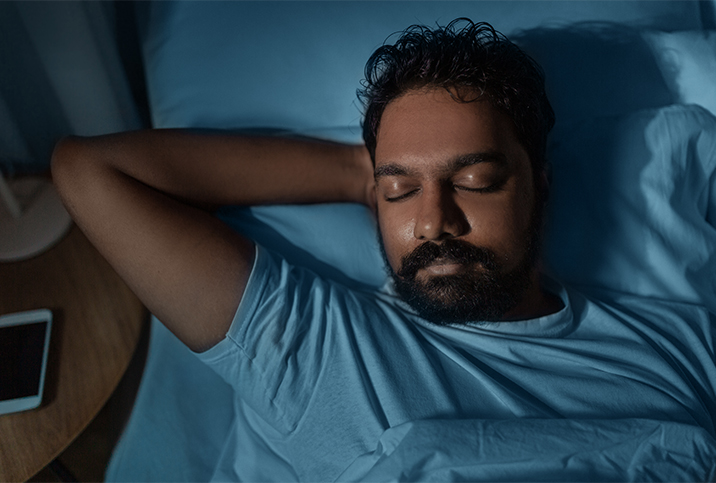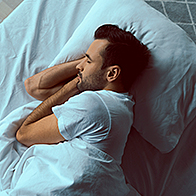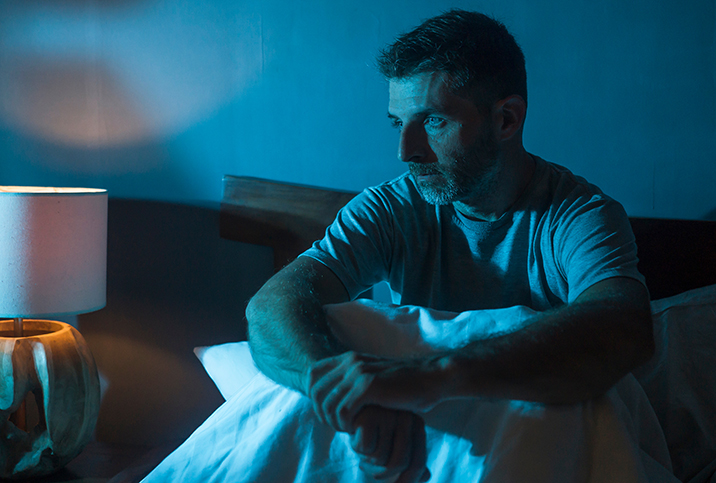The Physical Effects of Sleep on Men's Sex Lives

Most people understand sleep is essential, but folks also lead busy lives in a world that feels as if it's constantly changing and increasingly chaotic. It would be nice to count on a full eight hours of sleep nightly, but you can't always control children who wake you up or a project at work that runs late, forcing you to sacrifice a few hours of rest.
People know missing out on sleep is bad but do it anyway. You might tell yourself an extra cup of coffee will help you focus or that you'll try to "catch up" on sleep over the weekend.
Sleeping is one of the most vital bodily processes. In the short term, sleep helps wipe away the day's exhaustion and gives the body much-needed rest and recovery. During sleep, human bodies work to repair themselves; they fight off inflammation, lower cortisol levels (the stress hormone), give the sympathetic nervous systems a chance to cool off, and process the day's information. Long term, this daily reparative cycle ensures the overall health of the body and works to repair daily wear and tear. Sleep also promotes mental well-being, influencing your levels of focus, stress and happiness, to name a few aspects.
There are many reasons to make sure you're getting enough sleep, but there's one, in particular, you might have let slip under the radar: your sex life.
The mental effects of sleep deficiency can impact stress and, by proxy, libido. Even worse, the physical effects of missing out on sleep might mean you miss out on sex, too.
"There's a direct link between sleeping and your overall health," said Mehdi H. Shishehbor, D.O., M.P.H., president of University Hospitals Harrington Heart & Vascular Institute in Cleveland. "There is a link between your sleep and your blood pressure, and a major reason people don't sleep well is because of what we call 'sleep apnea.'"
How does sleep apnea affect your sex life?
Sleep apnea is a common condition that disrupts a person's breathing while asleep, often resulting in loud snoring, gasping for air during sleep, a dry mouth and a headache the next morning. Sometimes, sleep apnea can lead to insomnia, hypersomnia, irritability and an inability to focus the next day.
Most importantly, however, sleep apnea disrupts the sleep cycle itself, meaning people who suffer from it aren't getting the adequate amount of rest their bodies desperately need.
"If you don't sleep well, that can raise your blood pressure," Shishehbor said. "If you have high blood pressure, that can damage the heart and the vascular system. It can make the heart weak. It's also important from the standpoint of inflammation and stress. All of those things affect the penis."
Most men may not understand the underlying anatomy of the penis and how it is much like many other organs and is interconnected with other health issues. Like other organs, its function can be impacted by sleep hygiene.
"[The penis is just] another organ that has blood vessels and nerves. The structure of the penis only has four components, right? It has muscle, it has arteries, it has veins and it has nerves," Shishehbor said. "Anything that impacts those four components can impact the penis. There is a significant overlap between erectile dysfunction and hypertension."
Even disregarding the sexual component, Shishehbor added, erectile dysfunction (ED) by itself is a risk factor for heart disease. Though ED is not a cause of heart disease, it can be an indicator that something has gone wrong in your body, which could cause the ED.
University Hospitals' chief of male reproductive and sexual health, Nannan Thirumavalavan, M.D., expanded further on the role of sleep and the effects of poor sleep quality on men's reproductive health.
Specifically, while speaking about the beneficial results of continuous positive airway pressure (CPAP) therapy in treating symptoms of sleep apnea, Thirumavalavan said men who use CPAP machines can see improvements in their erections.
"Especially at night, because you have nocturnal erections, which are very important for your overall erection health," he said.
How do nocturnal erections benefit genital health?
Certainly, most people with a penis are familiar with "morning wood," but as Thirumavalavan pointed out, this isn't exclusive to the sunrise. You actually have erections multiple times throughout the night, though you may be unaware of them. This is a normal physiological process.
"You can think of it almost as your penis rehabbing or going through maintenance," Thirumavalavan said. "With your nighttime erections, you have a long time to fill your penis up—every REM cycle, your penis is filling up."
The growing understanding of how sleep affects the body, and specifically how the penis performs maintenance throughout the night, has contributed to doctors' understanding of what might be causing someone's ED.
You actually have erections multiple times throughout the night, though you may be unaware of them.
The old school of thought taught that if a man struggled to get erect for intercourse but retained normal nighttime and morning erections, the cause of ED was likely "all in their head," but now, doctors see that isn't always the case.
"The reality is at night you have like an hour and a half for your penis to slowly fill up with blood, whereas when you're getting ready to have sex, it has to fill up much more quickly," Thirumavalavan said.
Some doctors use a multidisciplinary approach to treating their patients' ED, which is one Shishehbor strongly urges.
"We are interconnected," he said. "We are one system, and you cannot treat that system in a silo."
The interconnectedness of the body means issues in one part of the body don't exist in isolation. Heart issues affect the brain and the sex organ, for example. An issue with your spine might affect the motor control of your fingers. When we talk about sexual health, we're really just talking about overall health.
Taking care of yourself in a general sense means taking care of your health in more specific areas, and that includes getting a good night's sleep.




















